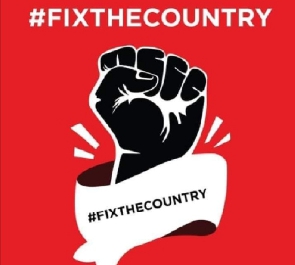Introduction
As expected, there is never a week that passes by in our motherland, Ghana, without we having to discuss one issue or the other. In a week gone by, we witnessed an avalanche of news items on the media landscape on some matters deemed disturbing in our country.
As a nation, we take much interest in discussing topical issues anchored on various thematic concerns including but not limited to the economy, education, health, entertainment and even those that concern the 'bedroom'.
Sometimes, we discuss these things with some kind of inflame and undiluted passion and even in most cases, albeit momentarily, to the point of mockery. We often do this on our own volition and we do so manifestly without any let or hindrance.
Going forward as a nation, this is good for our infantile democracy and should be encouraged or at least be seen to be encouraged.
Indeed, yours truly would be the first person to advocate that, any attempt to thwart same through the ‘culture of silence', should be fiercely resisted by the people of the country.
We should not spare time to describe such acts as repugnant and an affront to the spirit and letter of our constitution, through which the power to rule and to govern is vested in the hands of the people. Article 1(1) of our constitution, 1992 adroitly puts it that:
"The sovereignty of Ghana resides in the people of Ghana in whose name and for whose welfare the powers of government are to be exercised in the manner and within the limits laid down in this constitution"
Culture of silence
Having said this, it will equally be unfair to describe as untenable that, a person has no right to say there is a return of the ‘culture of silence’ in our country. The right to freedom of speech and of expression of our thoughts is provided for under article 21 (1a).
That freedom, granted by the constitution, sanctions the citizens and gives them the unrestrained right to express themselves according to the dictates of their conscience and thoughts.
Tolerance of divergent views is what makes us great as a people and as a nation since the return to constitutional rule of the 4th republic, and to say we are held in high esteem among other African countries and even in the world for this feat is an understatement. It is a value we so much cherish. It is a value we so much love.
Fixing the country-propaganda-made good
The above development notwithstanding, the determining issue now is whether or not; Ghana in its present state is witnessing a culture of silence, both in substance and in fact.
Truth be told, we cannot get objective answers to this conundrum if we were to administer a set of questionnaires to the over 30million Ghanaians in the country.
It is admirable to admit that, in most cases, we all have vested interest in the outcome of this study. Consequently, we will all be “wrong” in our assertions in the same magnitude as we will be deemed to be “right” because of the likelihood of self-serving bias.
To a larger extent, this affects the development of the nation as it negates consensus building. It is a decade old problem that we must work collectively to get it fixed as a nation. But we cannot do this through propaganda. We can do this through nationalism.
All being well, the citizens are beginning to appreciate the power they possess and to exercise same within the limits enshrined in the 1992 constitutio. The political propaganda that characterized the whole discourse by the two main political parties should be discarded and discouraged.
At least, political parties, their hirelings and protégés and or anyone with vested interest to get should not be seen leading the discourse.
From the discussions thus far, it could be reasonably inferred that, if there is any broken system at all in the country that needs to be fixed, it is they (NDC and NPP) who broke it.
The irony of the whole discourse is that, these two political parties have had the opportunity to govern the nation since 1992. They could not fix it and they cannot fix it, given the fact that, the discourse is tilted towards partisan interest to catapult cheap political points.
We should not and cannot rely on them to fix it. Fixing a nation requires that we must imbued in ourselves, the zeal and the zest with some nationalistic values to enable us to discuss issues passionately devoid of the nuances of pedestrian political propaganda.
At the moment, this is not what is happening, and I am afraid we may only be pouring water on rocks as usual. Let’s drop the propaganda and get seated on a round table.
Click to view details



Opinions of Saturday, 8 May 2021
Columnist: Bassing Kamaldeen
Fixing a country requires nationalism not propaganda
Opinions


















